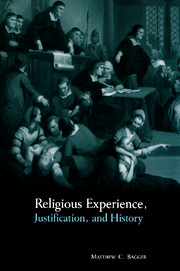Book contents
- Frontmatter
- Contents
- Acknowledgments
- List of abbreviations
- Chapter 1 Introduction: spectral evidences
- Chapter 2 The explanation in experience and the explanation of experience
- Chapter 3 Justification by reasons alone
- Chapter 4 Perennialism revisited
- Chapter 5 The miracle of minimal foundationalism
- Chapter 6 Loves noble Historie: Teresa of Avila's mystical theology
- Chapter 7 Modernity and its discontents
- Bibliography
- Index
Chapter 6 - Loves noble Historie: Teresa of Avila's mystical theology
Published online by Cambridge University Press: 22 September 2009
- Frontmatter
- Contents
- Acknowledgments
- List of abbreviations
- Chapter 1 Introduction: spectral evidences
- Chapter 2 The explanation in experience and the explanation of experience
- Chapter 3 Justification by reasons alone
- Chapter 4 Perennialism revisited
- Chapter 5 The miracle of minimal foundationalism
- Chapter 6 Loves noble Historie: Teresa of Avila's mystical theology
- Chapter 7 Modernity and its discontents
- Bibliography
- Index
Summary
Those rare workes where thou shalt leave writ,
Loves noble Historie, with wit
Taught thee by none but him, while here
They feed our soules, shall cloath thine there.
Each heav'nly word, by whose hid flame
Our hard hearts shall strike fire, the same
Shall flourish on thy browes, and be
Both fire to us, and flame to thee;
Whose light shall live bright, in thy Face
By glorie, in our Hearts by grace.
Richard Crashaw, Hymn to Sainte Teresa (1648)In this chapter I undertake a detailed study of the entire spiritual path which Teresa promotes. By contrast, many contemporary thinkers excise limited passages from Teresa to lend their own agenda some historical weight. Both Forman and Alston, for example, employ short excerpts from Teresa to give their own favored experiences the heft of tradition. By culling from Teresa's vast corpus the particular experiences that most resemble those they wish to defend, they add gravity to their positions. Of all the different sorts of spiritual favors which Teresa relates, Alston singles out the intellectual vision as an exemplar of the particular experience he wishes to use to justify beliefs about God. He ignores all the other experiences and excerpts a passage from Teresa where she recounts an intellectual vision. He selects her famous vision of Christ at her side. He believes that her experience instantiates his model of the non-sensory perception of God.
- Type
- Chapter
- Information
- Religious Experience, Justification, and History , pp. 135 - 196Publisher: Cambridge University PressPrint publication year: 1999

